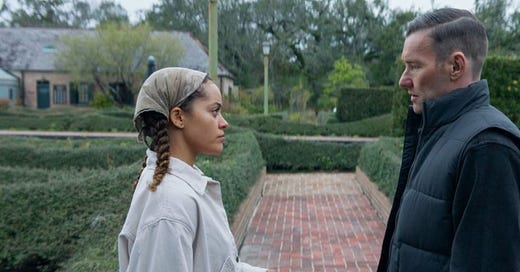Indy Film Fest: Master Gardener
Paul Schrader keys up for another exploration of the darker reaches of the human soul, as Joel Edgerton's gardener tries to reconcile his past with the alien notion of hope.
For Indy Film Fest schedule and tickets, please click here.
Hope is not a thing that figures highly in Paul Schrader’s films.
The writer behind “Taxi Driver” and “Raging Bull” is very much about exploring the darker reaches of the human soul, a dim place where the light of hope rarely intrudes. He’s gone on to a rich career as a director, too, with even bleaker fare like “Affliction” and “First Reformed.”
(If you haven’t seen the criminally unappreciated “The Card Counter” from a couple of years ago, do so.)
So I was surprised to hear Narvel Roth, the protagonist of “Master Gardner,” talking about hope. He’s a very orderly man played by Joel Edgerton who tends a world-class garden for a rich older lady, Mrs. Haverhill (Sigourney Weaver). Narvel lives in a small cabin across from the main house, leading the team of gardeners by day and writing in his journal about gardening at night.
“Gardening is a hope for the future,” he inscribes. Narvel likes gardening because it’s the taming of wild things to man’s desires, and because meticulous care will usually yield positive results. He’s less about the aesthetic beauty of growing things than the pleasing ability to control them. With his slicked-over hair and staid manners, Narvel doesn’t like to talk about himself, or much of anything other than gardening.
Mrs. Haverhill — she would never dare let the help use her first name — sees the garden as her personal pride, hosting a major fundraising event at her home, Gracewood Gardens, every year. If it feels a little bit like a plantation where she is the queen and the employees are her well-tended charges, then so be it.
As we soon learn, Mrs. Haverhill also insists upon using Narvel for her carnal needs — not so often as she’s getting old, but always in the timing and manner of her insistence. The signal that she’s feeling frisky is when she starts calling him “Sweet Pea.”
This tidy arrangement starts to fracture with the introduction of Mrs. Haverhill’s long-estranged grand-niece, Maya (Quintessa Swindell). She used to visit Gracewood as a child, but her mother fell into drugs and died, and it seems Maya is in danger of sharing the same fate. Mrs. Haverhill wants to help her, though in the sort of distant way of old money: bringing her in as an apprentice to Narvel.
If things work out, she envisions herself retiring from social life and turning the gardens over to Narvel permanently, with Maya potentially inheriting the rest. So this is a test for Maya, but also for her teacher. There is also the issue of Maya being “half blood,” aka biracial, to use Mrs. Haverhill’s crude anachronism.
I’ll cut to the chase: romantic longings begin to develop between Narvel and Maya, which endangers everything. There is also his own dark past, long put behind him but never entirely forgotten, as a member of a skinhead gang. It’s literally etched into his skin in the form of daunting tattoos he keeps carefully covered but has decided not to erase, perhaps to remind him of the pitfalls of the past.
The screenplay by Schrader is in some ways familiar and also surprising. I felt certain that visitations from Narvel’s past would be inevitable, as foreshadowed by his U.S. Marshal handler (Esai Morales), who warns him that any young Nazi knuckle-dragger would love to make their bones with his scalp.
There will be troubling developments leading to tension that builds toward dark acts of violence. It wouldn’t be a Schrader film without them. But things perhaps don’t bloom in exactly the way we might expect.
I found most interesting the movie’s exploration of the shifting nature of power within established relationships. Narvel is Mrs. Haverhill’s servant in more ways than one, but is never servile, treating their exchanges as negotiations with someone wielding more power — cordial, and careful. Maya starts out rather rebellious and impertinent, gradually learns to keep her place, but shows signs of craving dominance just as her great aunt does.
She likes testing Narvel, and he in turn is intrigued by her probing.
I wasn’t entirely sold on Edgerton’s performance. Narvel seems to thrive as both teacher and submissive, alternating between extreme passiveness and aggression. I would like to have seen more evidence of moral conflict about the internal clash of these impulses, or possibly even some perverse satisfaction in trading roles.
In some ways it’s really a BDSM story, just without the whips, leathers and other paraphernalia.
You’ll have to explore for yourself to see if Narvel’s budding sense of hope is rewarded or punished. It would be exactly Schrader’s speed to plant the seeds of optimism with the audience and then poison them, leaving us clinging to vanishing hope as the dreamed-of fruit slowly rots.





